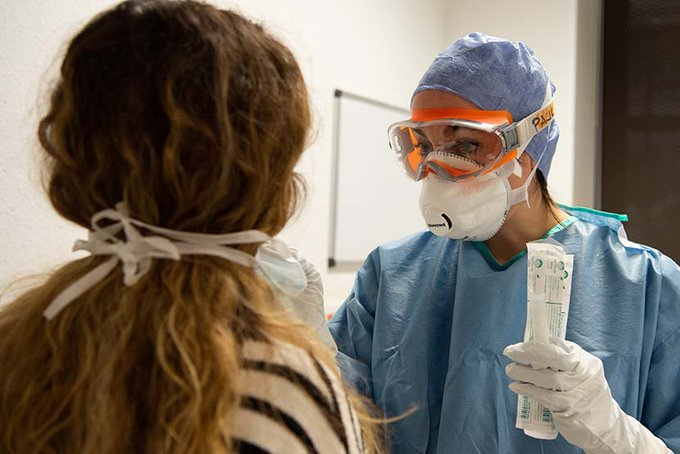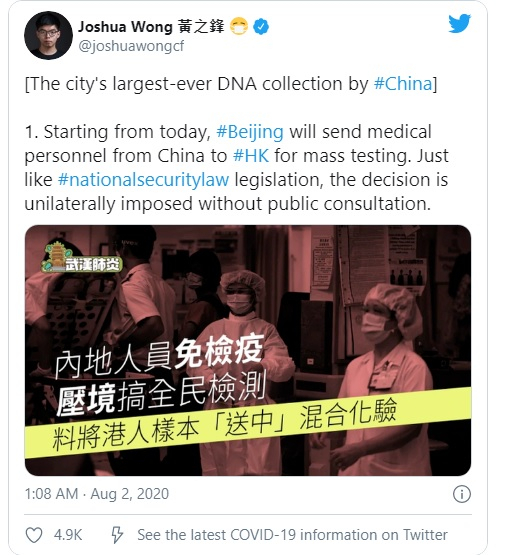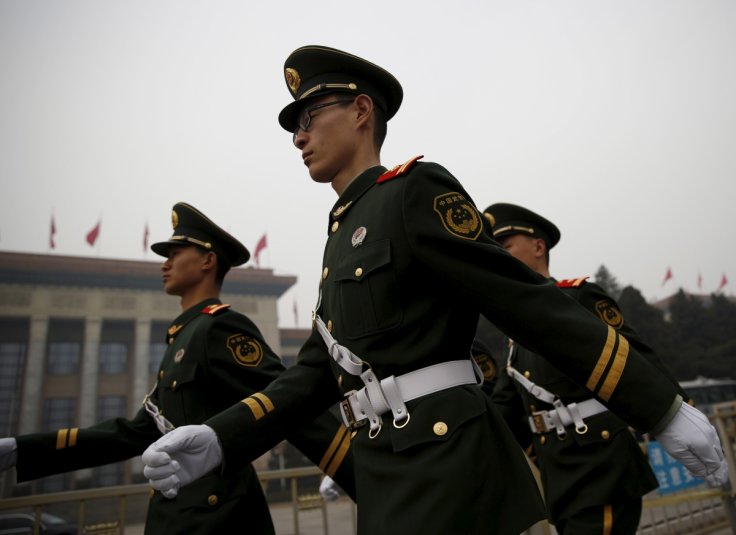Seven Chinese health officials have arrived in Hong Kong from the mainland China as part of the first members of a 60-person team that will carry out widespread Coronavirus testing in the territory. But before their arrival, Hong Kong student activist Joshua Wong said in a Tweet, "The city's largest-ever DNA collection by #China."
The Hong Kong government denied such accusations and said there are no plans to harvest local resident's DNA as part of a China-backed coronavirus-testing blitz. The health officials from mainland China are setting up temporary labs to expand the ability to curb the Coronavirus spread in Hong Kong, which has reported over 3,500 cases as of now and the maximum number of infection cases have been reported recently.
However, as per the reports, the health experts involved in the testing team-- co-ordinated by the Chinese Communist Party ruled government—are mostly from public hospitals in Guangdong province.

The efforts to track the third wave of Coronavirus cases in Hong Kong comes amid the distrust of Beijing's presence in the city and fueling the suspicions that authorities would use the mass testing opportunity to collect DNA samples from the residents of the semi-autonomous city.
In a statement, the Hong Kong government explained that the collected samples from Hong Kong residents "will not be transported to the mainland for testing" and blamed "certain individuals" for spreading DNA harvesting theory online. The authorities said they would look into such "untrue claims" and file criminal offense against those spreading them.
Coronavirus Testing and Fear
On Friday, July 31 the Hong Kong government claimed that the new wave of COVID-19 cases had forced it to postpone the Legislative Council—LegCo—election, which was supposed to take place on September 6. But many accused the government of using the Coronavirus pandemic as a pretext to suppress democracy.
Carrie Lam, Hong Kong's chief executive said on Saturday, Aug 1 that the city had asked for help from Beijing due to the resurgence in COVID-19 cases. Later, CCTV, a Chinese news organization, reported that Hong Kong's 7.5 million residents would receive free COVID-19 testing and estimated that the testing could be completed within "a few days." But there was no explanation about how the testing drive would be conducted.
On Sunday, a group of Hong Kong councilors said some local residents expressed apprehensions that Beijing may use their presence in the city as an opportunity to collect DNA samples for surveillance purpose. Even activist Wong also raised similar concern in an August 2 Tweet which stated: "Starting from today, #Beijing will send medical personnel from China to #HK for mass testing. Just like #nationalsecuritylaw legislation, the decision is unilaterally imposed without public consultation."
However, as per the reports, the health experts involved in the testing team -- co-ordinated by the Chinese Communist Party ruled government—are mostly from public hospitals in Guangdong province.

DNA Database
As per a report by Human Rights Watch, Chinese police officers were accused of collecting DNA from individuals for a nationally searchable database without oversight, transparency, or privacy protections. There is also evidence that has suggested that the local governments in the controversial area of Xinjiang intends to accelerate the collection and indexing of DNA. Apart from the ethnic minority region of China, in many parts of the country, Chinese police were found to manipulate or force people to have their blood drawn and DNA was taken.

Sophie Richardson, China director at Human Rights Watch said, "DNA collection can have legitimate policing uses in investigating specific criminal cases, but only in a context in which people have meaningful privacy protections. Until that's the case in China, the mass collection of DNA and the expansion of databases needs to stop."
In June, the Australian Strategic Policy Institute said in a report that the CCP government is "building the world's largest police-run DNA database" enrolling millions of people with "no control over how their samples are collected, stored and used."
It was also reported that Hong Kong police have already started to collect DNA samples from protesters arrested under the new national security law. Police said DNA samples were collected from 10 people arrested individuals on July 1. This act may have fanned suspicions, but Secretary for Security John Lee Ka-chiu explained it differently.
"When police officers are investigating a criminal case and they think collecting some samples will be helpful for investigating the cases and provide evidence to prove some crimes, then they can exercise such power," he said.









